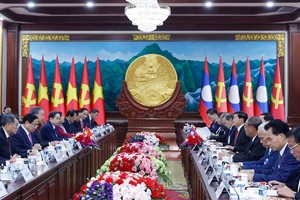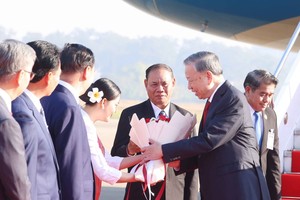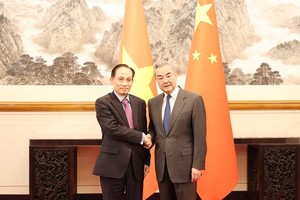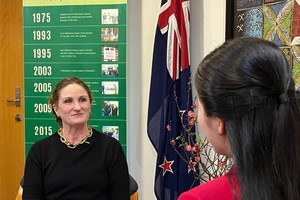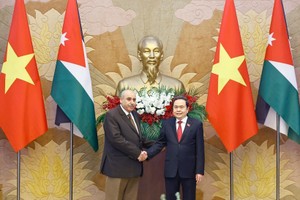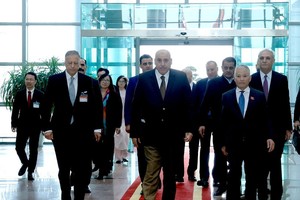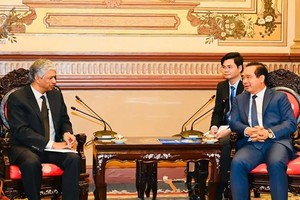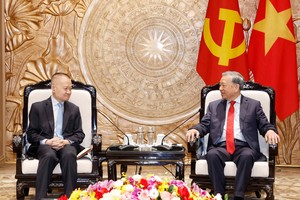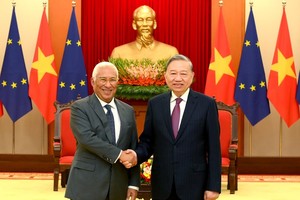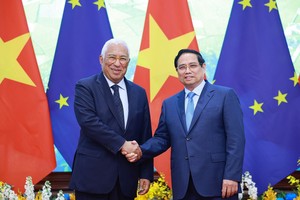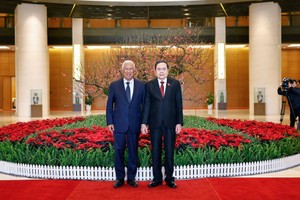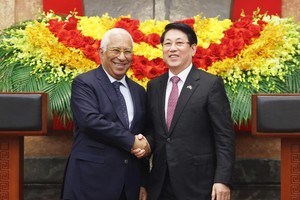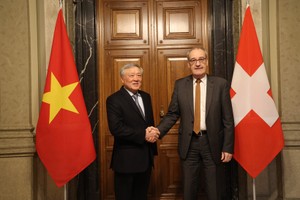WASHINGTON, May 9, 2011 (AFP) - US President Barack Obama pressed Pakistan to probe how Osama bin Laden managed to live for years under the noses of its military, saying he must have had some kind of support network.
Under mounting pressure from both Washington and his own people, Pakistani Prime Minister Yousuf Raza Gilani was to brief his country's parliament Monday on the US operation that killed bin Laden a week ago.
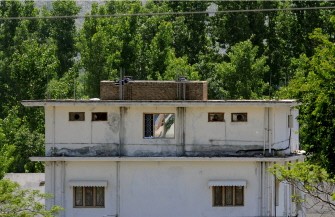
The White House also called on Islamabad to help counter growing mistrust by granting US investigators access to three of bin Laden's widows who are in Pakistani custody and could have vital information on Al-Qaeda.
"We think that there had to be some sort of support network for bin Laden inside of Pakistan," Obama, speaking on the matter for the first time, told the CBS show "60 Minutes".
"But we don't know who or what that support network was. We don't know whether there might have been some people inside of government, people outside of government, and that's something that we have to investigate and, more importantly, the Pakistani government has to investigate."
One week after an elite team of Navy SEALs flew into Pakistan seemingly undetected, killed the Al-Qaeda leader and seized a treasure trove of documents and computer files, senior US officials said they had no proof that Islamabad knew about his hideout.
But the fact that bin Laden was "hiding in plain sight," as the White House described it, in a garrison city less than a mile from a top military academy and only 35 miles (56 kilometers) from Islamabad, has deeply strained ties.
Outraged US lawmakers have voiced suspicion that elements of Pakistan's military intelligence services must have known his whereabouts, and are demanding that billions of dollars in American aid be suspended.
Similarly, Pakistanis are furiously asking whether their military was too incompetent to know bin Laden was there or, worse, conspired to protect him, while at the same time denouncing the perceived impunity of the American raid.
The debacle has been a serious embarrassment for Pakistan's powerful military establishment, and Islamabad's civilian leadership has been left reeling.
A senior government official told AFP that Gilani would address the lower house of parliament and "take the nation into confidence" on the May 2 operation in Abbottabad.
"Gilani will speak in detail on various aspects of the operation, Pakistan's sacrifices in the war against terrorism and its future strategy to deal with the menace," the official said.
The main opposition party, Pakistan Muslim League (PML-Nawaz), said it would "react very strongly if we come to a conclusion that the speech was nothing but an eyewash," spokesman Siddiqul Farooq told AFP.
Pakistan's military has hit back at the allegations, demanding that the United States cut its troop presence in the country to a "minimum" and threatening to review cooperation if another unilateral raid is conducted.
For a decade, Islamabad has been America's wary Afghan war ally, despite widespread public opposition and militant bomb attacks across the nuclear-armed country that have killed several thousand people.
But Pakistan has never been fully trusted by either Kabul or Washington, which accuse its powerful military of fostering the Afghan Taliban it spawned during the 1980s resistance to the Soviet occupation of Afghanistan.
In his interview, broadcast Sunday, Obama held out the possibility of further action, saying that the vast haul of data gathered from bin Laden's compound could lead to other Al-Qaeda figures.
"We've got a chance to, I think, really deliver a fatal blow to this organization, if we follow through aggressively in the months to come," he said.
"We anticipate that it can give us leads to other terrorists that we've been looking for a long time, other high-value targets."
White House National Security Advisor Tom Donilon said the United States was focusing its attention on bin Laden's longstanding deputy, the Egyptian Ayman al-Zawahiri.
"Zawahiri will be the next number one terrorist that we're looking for in the world," he said.
Reportedly last seen in October 2001 in eastern Afghanistan, close to the lawless tribal regions along the Pakistan border, Zawahiri has released several videos from hiding, calling for war on the West.
Donilon told NBC's "Meet The Press" program that the CIA was describing the intelligence haul from the bin Laden raid as about the size of a "small college library."
He said that a "good starting point" for Islamabad to repair ties would be to provide direct access to bin Laden's detained widows.
"They have in their custody all the non-combatants from the compound, including three wives of Osama bin Laden," he told ABC.
Washington had yet to be given access, Donilon said, but "we haven't been told we can't either at this point. We'll certainly press on this very hard."
Pakistani security officials say bin Laden's Yemeni wife, who was shot in the leg during the raid, is undergoing medical treatment and interrogation in Pakistan along with 15 other relatives, many of them children.
"She said in Arabic that bin Laden and his family were living in this compound for the last five years and he never left the compound," one official said, speaking on condition of anonymity.
Pakistan's ambassador to Washington Husain Haqqani acknowledged "there was a crack that things fell through" and said "Pakistan will investigate," but he insisted officials were unaware that bin Laden was hiding so close.
"If any member of the Pakistani government, the Pakistani military, or the Pakistani intelligence service knew where Osama bin Laden was, we would have taken action," he told ABC.
Al-Qaeda has acknowledged bin Laden's death -- and vowed to avenge it -- but no successor has been announced and debate is now swirling over who might take the reins of the terror network.
In the final audio tape bin Laden recorded before being killed, he warned there would be no security for the United States until Palestinians are allowed to live in security, an Islamist website reported Sunday.

